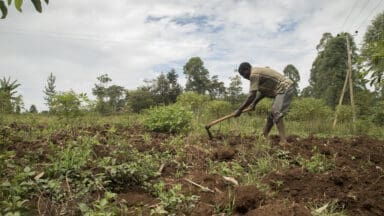
After maize, potato is Kenya’s second most important food crop and benefits some 2.5 million people across the potato value chain. A key economic agricultural driver, potatoes have an approximate value of $500 million per annum for Kenya.
The potato cyst nematode (PCN), which is currently devastating the Kenyan crop, is microscopic parasitic pest that invades potato roots, stunting growth and diminishing yields. To safeguard livelihoods, improve yields and contribute to food security, the scientists have introduced two PCN resistant varieties.
The project was a collaboration with the University of St Andrews, the International Institute of Tropical Agriculture (IITA), the International Potato Center (CIP), the International Centre of Insect Physiology and Ecology (ICIPE ), the Kenya Plant Health Inspectorate Service (Kephis) and Seeds2B Africa.
With origins from Scotland, the newly developed varieties, Malaika and Glen, combine the needs of local growers and PCN resistance. Research conducted revealed that Kenyan smallholder farmers require potato varieties that have low dormancy, (duration before sprouting), that can be replanted quickly after harvest and are fast cooking to minimise fuel consumption.
According to the researchers, around 90% of growers in Kenya, source seed from their farm or neighbours, with only 6% buying from certified seed suppliers. Using their research, the project is now developing plans for distributing the new potatoes to smallholders and provide guidance.
“The release of these two varieties is the culmination of many years work and is a collaboration between social scientists, crop scientists, plant breeders, the Kenyan Government, seed suppliers, and farmers. It has brought together researchers and stakeholders in the UK and Africa to help ensure that we provide solutions that align with the needs of growers in the region. I’m delighted that we have passed this critical milestone,” explained the Senior Scientist, Professor John Jones, the Hutton lead on the project.
The James Hutton Institute conducts scientific research and breeding programmes to develop new potato varieties with desirable agronomic characteristics and resilience to external stresses, such as temperature extremes and diseases. Malaika and Glen have the potential to be of value in the countries surrounding Kenya, where PCN is also present, and to provide reliable, resilient crops that offer a route to food security.
Initial support for the project came from Innovate UK and further support was provided through the International Plant Biotechnology Outreach (IPBO) from the Flemish Institute of Biotechnology and The Syngenta Foundation and now being championed to ensure that these new varieties reach Kenyan farmers.

